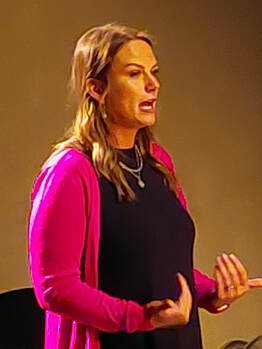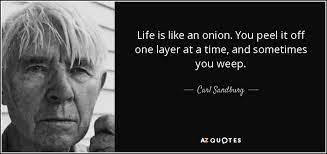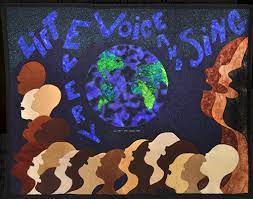 THE MAY QUEEN CHRONICLES: Now We Are Here by Thomas Putnam We look at scores of scripts every year in order to fashion a season. I haven't calculated, but I wouldn't be surprised if 85% of those we consider we never produce. Of that remaining 15% we choose the few shows that will comprise the next season. Sometimes when I peruse a script I can tell within a few pages that I just don't connect with it. It could be the subject matter; it could be poor writing; it could be a less-than-engaging story line. I try to plow through to the end, however, because...well, it ain't over 'till it's over. We're in the midst now of wading through scripts...and hoping for that 15% from which to choose and 2023 Season. Sometimes I see a play at another theatre and immediately think “HG should produce this one.” And that's what happened with THE MAY QUEEN. I had heard of it when it was workshopped at Chautauqua a number of years ago, but didn't see it until it was produced at the Geva in Rochester. I knew immediately that I'd like to direct it with HG. I sent for the script and my reading of it confirmed that it was a show we ought to—needed to?--produce. The weeks of rehearsal confirmed even more that this is a play we want to share with our community. The in-depth discussions, the questions, the character analysis, the crawling around in another's skin...all have deepened my appreciation for this work. And the audience response. I wish I could record the responses of people as they leave the theatre. From their comments and expressions, I know that I'm not the only one moved by this work. This is noTV fluff that you forget about the moment you turn it off. This one stays with you. I'm hoping you will allow it to stay with you, by attending one of the remaining performances: May 27 and 28 at 7:30. And then it's gone. The beauty and the reality of live theatre: this work will never ever be revisited. It is not a disc or a stream that can be watched and re-watched at whim: it will only happen in this spot at this time with these actors on stage with these audience members with this weather through the lens of all the personal stuff that's going in your life at this moment. Now we are here. ReplyForward
0 Comments
 THE MAY QUEEN CHRONICLES: We're Telling Stories by Thomas Putnam Some of you may remember the Storytelling Festivals that MU hosted a few years ago. (Well, maybe a few decades. Was it really half a century ago?) I remember the experience as if it were just a few years ago. One person standing there telling a story. No sound track. No special lighting. No second takes. Just one human being telling a story to another, or in that case to hundreds of other humans. There was something incredibly powerful in those moments, something incredibly human. I've come to realize how much we need to recognize the power of story. It's what we do as humans. I'm not convinced that any other living form can do such a thing (though I'm not ruling out the possibility.) Indeed, it is what makes us human. I think I've mentioned before in these blogs that during the depths of the Pandemic, some on the committee that helps to decide on what plays we're going to produce the following season felt that what we all needed at that time was to laugh...some plays that were just plain funny. I disagreed then and even more so now. I believe what we need is to tell stories...and to hear stories. During the course of the process of getting THE MAY QUEEN to the stage, I've been struck with the story-telling nature of this play. Every character in the play has a moment (or more) when they tell a story. Remember, this play takes place within the four walls of an office pod—anything but a reflection of healthy humanity. And yet in this sterile place, five humans meet and interact and tell stories. A few of the stories are pages long in the script. We find out that some of the stories that have been told in the past turn out to be not true. (We're certainly familiar with that phenomenon in this country in recent years!) But the play is about telling the truth...telling true stories. It's a powerful experience. We've got the audience almost circling the action of the play. One of the reasons is for us as listeners of stories to be a part of the action in that life-less pod and to allow ourselves to be quickened by the experience of being hearers. Truth is told. Stories are told. It's what theatre—and life—is all about.  THE MAY QUEEN CHRONICLES: SO MUCH CAN HAPPEN IN A "POD" by Barbara Biddison Last night I saw a dress rehearsal. Just five people and 4 desks and 4 chairs and all kinds of "stuff" kept my rapt attention for an hour and a half. These three women and two men are so real and so clueless sometimes that I laughed out loud, and so different in character, and so troubled at other times, that I cried. In the opening scene Dave is moving about and Mike is drunk, and normally drunk isn't funny in my world, but he's funny And his desk is so cluttered with garbage from the food he brings in to eat that there is no desk surface to be seen. And then there's Gail, older than the others, dressed in crazy beautiful "work clothes" and blessed with the ability to give a massage in the office. Then in comes the tiny irritating, insecure, loud office manager with a new sullen, quiet "temp" who it turns out is not as much of a stranger to the others as we had thought. So we watch all of them try to sort things out. Who IS this woman? This play is for me the kind of treat that I don't usually have as a long-long-time audience member. I've been going to plays since my late teens. I've been going to HG plays for its 30-some years of existence. For much of that HG time I've been on Artistic Planning, and that means that I have probably read every play here before I see it. Usually I just love to see the stage come to life. What I have read becomes real, pretty much as I hoped for and pretty much as I had expected. Well, this one is different. I read it. OK. But this play comes to life on stage in a way that I could never have imagined. This play goes from reading a "not-my-all-time-favorate-play" to an " I really want to see it again, maybe twice again" play. Seriously. The acting is really good. But more than that, This play must be seen and heard live. Yes, live and on stage. I drilled lines with a couple of the actors. We talked some about what was going on there. I was familiar with the words, but no play is just about words. Good plays are about people and emotions and life happenings. We have to pay attention when we see this play. Dialogue is clever and meaty and often funny. The long monologues are works of art thanks to the playwright and the character who speaks. And their timing is just so good. Ah, yes,. Who is Jen Nash?  A CERTAIN FOUR-LETTER WORD by Thomas Putnam There was a moment in the long, wonderful process preparing the one-man play UNDERNEATH THE LINTEL that is vivid in my memory, even though it was way back in 2008. We were rehearsing in what is now called the Deane Center, and was then the empty shell of the Davis Furniture building. We had fashioned a little theatre on the lower level and built a bit of a stage. At one point during the rehearsal, Bill Scott—who had designed and was running tech—loudly and passionately burst out with a few words. One of them was a four-letter word. He said there....there is the central issue in this whole story; it all boils down to this one word. In the process of preparing this play THE MAY QUEEN, there is that same one-word issue. It is here, in this one word that sets the path for at least two of the characters in the play, and thus affecting all of them as their lives intersect in this dreary office pod. There are a number of four-letter words in this script, most of them quite crude. But in the midst of these other words, is this one. It is only mentioned in one long passage spoken by Mike (Vincent Nance) toward the end of the play. (And btw, it is not “love.”) It all boils down to this one word. Listen for it.  The People (We Think) We Know by Thomas Putnam There's a Robert Frost poem, can't remember the title but I remember studying it once. In it is the image of a number of cords that are connected to the the speaker of the poem. My memory may be mixed up, but I do remember such a poem and that image has stayed with me for decades. How much is our personhood shaped by those with whom we have connections? How important are such persons in our lives in determining who are are or will become? These are questions I've pondered as we work through the process of bringing Molly Smith Metzler's insightful play to the stage. Five characters make up the cast of THE MAY QUEEN, but I've been struck with how many other people are mentioned—by name—in the story. I get the feeling Metzler is nudging us to ask those questions in the first paragraph. There are two very distinct time periods in the play: the one of the action of the play—March-ish around 2014. The other time period is 15 years previous when three of the characters were high school students. The questions being urged to ask include are we the same person we were in high school? How much are we shaped by events that occurred 15 years previous? Can people change? Do people change? Add to these questions about events the numerous people mentioned and we're doing a lot of questioning! Besides the characters we see and hear on stage—Jen Jen Nash, Mike Petracca, Gail Gillespie, David Lund, and Nicole (no last name)--there are a host of other people referenced. Jen's parents, Mike's mother and brother Jeff, Gail's husband Ron and daughter Sadie and son Tate, Dave's mother, a former employee “Uncle Carl,” a local gossip Mrs. Fisher, a former classmate Jason Hoyt, Gail's drinking friends Greg and Darla, high school boys Bobby DeLeo, Ricardo Ferarro, Joey Plunkett. T.J. Manling, MaVar Tinzley, Seth Breckman, Luke Guyman, Shane Boman Todd Zook, Jacob Markowitz, and high school girls Kelly Vance, LaQeisha Parker, Candace Darch, Kyla Clausi. There's even more than one reference to the character Russell Crowe played in A Beautiful Mind. These cannot be present, by name, without those questions about how much the people in our lives shape us. I have recently come in contact with people I haven't seen for decades, and I realized that the people I know now have no clue about the various sets of people from various eras of my life. Current people think they know me. But, looking back at the different groups of people that I was connected to throughout my life, I'm thinking—as does Jen Nash in the play—they really don't.  MAY QUEEN CHRONICLES: And Sometimes You Weep by Thomas Putnam Sometime this last winter, I read a discussion about the nature of catharsis in Greek tragedy. To the Greeks, theatre can arouse feelings connected with recognized problems by presenting these on the stage, thus allowing the audience to relive them passively and, because of their non-real presentation as drama, also to resolve them. I had been aware of this, but the article focused on who the audience was at the time the Greeks were writing and performing tragedies. The Greeks were immersed in war. The writers and actors and audience were immersed in war. Theatre afforded an opportunity to help deal with the real-life horrors of war by seeing someone else live through them. Aristotle believed that an audience's ability to feel the same emotions as those displayed by actors onstage is an integral part of the experience of watching theater, and that through this experience, audiences can learn to better regulate their emotions in real life. An audience is far more likely to have a cathartic experience if they form a strong attachment to, or identification with, the characters. THE MAY QUEEN could by no stretch be labeled a tragedy. I believe, however, that some of the issues we are dealing with today, having lived through two years of having so much of our comfortable lives stripped away, and not knowing how to cope with the unfamiliar mental state we are left in, are very present in this play. I offer the possibility that audiences may very well experience catharsis as they connect with these characters and the problems they are working through. Thankfully there is much humor in the play which helps us through the difficult times. The play takes place in an office, a far cry from the horrors of the war that the Greeks—or Ukranians—have to face. But in the stifling four walls of this office pod, five humans connect and disconnect and struggle and challenge and laugh...and sometimes weep.  MAY QUEEN CHRONICLES: PUTTING DOWN THE SCRIPT by Barbara Biddison So, here we go with memorizing THE MAY QUEEN. There comes a time in the rehearsal process when the director tells the cast, "OK, put down your script." Before that the actors have drilled their lines and worked at memorizing them. Then, still with script in hand, actors head for the stage and the director blocks their movement. Furniture appears, and props find their uses, and the show begins to come alive. And by this time, by some miracle, actors are supposed to have memorized their lines, and the director's voice says it's time to put down the script. Well, it's not quite that neat and simple sometimes, but that is the process. And I was privileged to sit watching the rehearsal for THE MAY QUEEN when those words were uttered by the director, and, they were followed by the director's statement that he wouldn't be giving them lines and they should just keep going as best they could. So they did just that. This is a play with only five characters and with dialogue that goes "here/there/this way/that way" as it moves along. And I decided to "put down" my observer's script also. I wanted to know if I would catch all the bits of the story that are tossed out and that fill in the story. I did! I was, for instance, interested in how we learn about someone called "Jeff" early on and whether that knowledge stays with us when we hear Jeff's name much later in the play. I was satisfied. So, that led me to thinking about how this play is sometimes advertised as "not recommended for children." I think it's true that this is an adult story. Teens would understand it as well as mature adults would, but young kids don't have the life experience necessary to appreciate it. Teens and adults who stay with it will be rewarded with the emotional impact of how the story unfolds. A few treats for this play. You'll see actors you've seen before in other HG shows, and you'll admire actors that are new to our stage. And you'll enjoy the theatre setup with audience on both sides. And, though you won't see him, you'll be pleased to know that a young man is running sound for the show, the same one who ran sound for the last show...and he sings too!! Seems like there's just no end to HG opportunities. .  MAY QUEEN CHRONICLES: LAYER BY LAYER by Thomas Putnam Have you ever stripped wallpaper from a wall? Or refinished a piece of wooden furniture? It's great fun to see what patterns or colors were chosen by former residents of the room. One piece of furniture I stripped had three different colors of paint in addition to a stain. Taking away the layers, one at a time, to reveal the essence. I've been thinking of this image as I've worked through the process of production for our upcoming show THE MAY QUEEN. The comedy/drama is constructed much like a detective story. We're given a slight bit of information but rather than confirming anything, that bit simply makes us more curious. Sometimes, in fact, we don't even realize it is a clue to something we may discover later. But one bit at a time we discover much about each of the five characters in the story. Four of the characters have known each other in some capacity in the past...and they think they know the person. But, oh, what back-stories we discover as layer after layer is peeled back. There are some very funny bits in this story and it's a good thing, because we just might not be able to handle some of the revelations. Playwright Molly Smith Metzler knows us, and has a keen sense of what we can handle and just when we need comic breath before we plunge headlong into new discoveries. It's good writing, and good theatre. The power of story. If someone were to ask me what this play is about there might be a tendency to give some basic facts in a few sentences...or one long run-on. But I can't do that; it would not be the story with all its power. No, I'm resisting the urge, and am urging you to experience the story with all its nuance and careful peeling back of layer upon layer.  I DREAM A WORLD by Thomas Putnam I had a rehearsal on Monday, and one on Tuesday afternoon, with kids who sing with the HG choral program. It's been a challenging two years to get to this place. We have not had a spring concert in two years. A core group of singers aged-out of the program. Covid seemed to try to drain the blood out of what we are trying to offer. Monday and Tuesday were the last two rehearsals before our annual spring concert; and those two rehearsals were so full of joy that I almost—almost—was able to forget what these last two years have done. The youth choir with kids in grades 9-12 began meeting again in September, masked and physically distant. A small group. The concert choir with kids in grades 5-8 returned with only 8 kids. (We once had 36 kids in this group.) The training choir with kids in grades 2-4 had no kids and then our conductor had a car accident so we didn't try to meet all fall. I opened up the youth choir to alumni and a few were able to join us for the year. Going into the MLK concert (which was rescheduled until the end of February due to Covid and a storm) we had a small, but solid group. Then, for a variety of reasons one by one the numbers again declined. Things are different. Commitment seems tenuous. Focus is hazy. Plan-making is sketchy. There's a lack...or a lessening...of some of the richness and fullness of life But the HG Youth Choir sang a song at the delayed MLK Concert in February called “I Dream a World.” Words are by Langston Hughes. I dream a world where... Sometimes it even seems impossible to dream again. But the choir sang a song and we reveled in the dream. Then we were invited to sing at the Wellsboro Men's Chorus 75th Birthday. I hesitated to accept the invitation: some kids were going to be away on that date, illness was making its rounds, a few singers just drifted away. But the HG Youth Choir learned a song, a welcome song from the Maori tradition in New Zealand, and we reveled in the welcome. We joined with five other choirs to sing and we reveled in the sound of voices singing. Our spring concert is this Sunday. It's Mother's Day and some may stay away because of those celebrations, but it was one of the few days that our singers were not involved with any school activities. Our first spring concert after having to miss two. And we're singing “I Dream a World.” And we're singing “We Are Not Alone.” And “Lift Up Your Voice and Sing” and “Kyrie Eleison” and “Dona Nobis Pacem” and “Because All Men Are Brothers” and “Sing Me to Heaven” and more. And we're singing...and hoping...and reveling in the dream.  And So May Begins by Thomas Putnam In less than three weeks we're offering a play that is an enigma. There are moments that are very funny. There are just as many moments that take you by surprise, that startle you, that confuse you, that cause you to say “whoa, time out.” I've seen some shows on tv described as “dramedy”, that combination of drama with comic moments or that comedy with serious moments. This is a tough one to describe. But I start by simply saying that I really like this play. I saw it first a few years ago at the Geva Theatre in Rochester and I knew when it was over that I wanted to direct it. After reading it I was even more convinced. Now with this cast, I'm even more convinced. And after our first full run-through yesterday, I'm yet more convinced. I like the play; and I like the process. This cast of five includes two people who have never been in an HG production; in fact they have not been in any production since they were in high school. Another has been in only one ten-minute play with HG, and again, nothing since high school. Two have been in HG shows. So with this relatively new-ish cast, it has been a challenge to work through memorization techniques, the blocking process, on-stage psychology, ensemble work. It has been meaningful to begin crawling around in the characters' skins as we connect various facts about each that are dropped from time to time. Exploring possible backstories is always fun and energizing. Three of the characters are just over 30; one is early 20s, one 40s. Two are living with parents; two are living with mothers; one is a mother living with a 20s daughter. I'm finding directing the play to be incredibly engaging. And, have I mentioned that it's a tough one to describe? |
Archives
July 2024
|
|
Hamilton-Gibson Productions
Providing opportunities for people of all ages to enrich and empower their lives through community performing arts.
OFFICE
29 Water Street, Wellsboro, PA 16901 PHONE 570-724-2079 |

 RSS Feed
RSS Feed